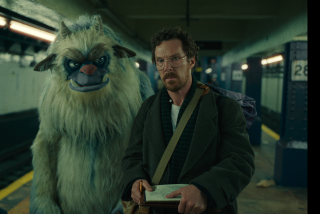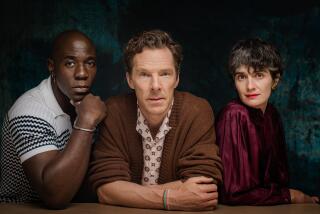Review: ‘Starred Up’ is a savage journey toward anger management
As unsettling as a hard slap to the face, “Starred Up” shocks the system. It marries ferocious, unnerving violence and waves of profanity to powerful, psychologically acute performances in a way that is intensely dramatic as well as almost unbearable to watch at times.
Those knockout performances come courtesy of rising star Jack O’Connell (the lead in the much-anticipated “Unbroken”) and Ben Mendelsohn, whose barely controlled malevolence was one of the highlights of the Australian crime drama “Animal Kingdom.”
Here they play two inmates in a British prison, each more unstoppably violent than the next. O’Connell’s Eric is only 19, but as the film opens he’s just been “starred up” — transferred from a juvenile prison to an adult one because he has proved impossible to control.
Neville, played by Mendelsohn, is considerably older and looks to be a bit more contained, but looks are deceptive. Neville turns out to be the enforcer for Dennis (Peter Ferdinando), the Machiavellian con who runs the prison’s illicit businesses, of which there are many, including buying off officials and guards when necessary.
Eric and Neville are so much alike in terms of savagery and rage you’d think they are father and son. In fact, with all the complications of lifelong estrangement that relationship implies, that’s what they are.
Set entirely inside a prison (and filmed inside Crumlin Road, a fully intact former institution in Belfast, Northern Ireland), “Starred Up” may sound like standard issue genre material. But though some conventional elements eventually emerge, for a pair of reasons this turns out to be genre pushed, and pushed hard, as far as it can go.
For one thing, the idea for “Starred Up” came from screenwriter Julian Asser’s dozen years of experience inside British prisons running an unconventional kind of group therapy approach to anger management that is a key story element. Actor Rupert Friend (“Pride and Prejudice,” TV’s “Homeland”) costars with O’Connell and Mendelsohn as a version of the writer, a therapist named Oliver.
British director David Mackenzie (“Young Adam”) upped the film’s immersive quality by shooting events in sequence, filming rehearsals and editing everything almost immediately. Mackenzie mandated such a quick editing turnaround that “we were looking at cut scenes the day we shot them.”
When we meet a shackled but very young Eric entering the inherently dehumanizing atmosphere of the adult prison, our first thought is that he will be some kind of naif, kind of like Tahar Rahim’s initially lost Malik in Jacques Audiard’s “A Prophet.” But as we watch Eric expertly construct and hide a makeshift knife, we know at once that this kid has been around.
More than that, Eric has a mean, volcanic temper and a perilously low boiling point, and “Starred Up” is not many minutes old before he has exploded to such an extent that his street-fighting skills find him with his teeth firmly clenched on the groin of an unfortunate guard.
All this fuss upsets top con Dennis, who tells Neville that the lockdowns resulting from his son’s violence are bad for his business and must be stopped. As Neville tells Eric, his new home is a ruthless place where making a murder look like suicide is child’s play.
While Neville’s concern for his son is genuine, it is also clear that a lifetime of being behind bars has ill-equipped him to say things in a way that Eric can hear. And that Eric, fueled by enough resentments to power a fair-sized generator, would be almost impossible to reach under any circumstances.
With all this as background, Eric is tentatively prevailed upon to take part in Oliver’s anger management seminar, a small group of convicts convincingly played by actors including Anthony Welsh and David Ajala.
It is a weakness of “Starred Up” that it is a bit unclear, frankly, exactly how or why this seminar works, and Oliver does have an unfortunate tendency to talk about people being “on a journey together.” But that doesn’t stop the scenes inside it, finely shot in neo-documentary style by cinematographer Michael McDonough (“Winter’s Bone”), from being explosive, as are the film’s frequent bursts of savage violence.
In fact, every single one of the multiple relationships inside the prison threatens to detonate at any moment, with the father-son relationship between Neville and Eric being especially incendiary.
With each person’s words and actions having the potential to literally destroy another’s life, we are immersed in all that brutality, listen to all manner of scabrous dialogue and feel as trapped behind these walls as any of the inmates. But it is the gift of “Starred Up” to make everyone intensely human as well, and that makes all the difference.
-------------------------
‘Starred Up’
MPAA rating: Unrated
Running time: 1 hour, 46 minutes
Playing: Sundance Sunset, West Hollywood
More to Read
The biggest entertainment stories
Get our big stories about Hollywood, film, television, music, arts, culture and more right in your inbox as soon as they publish.
You may occasionally receive promotional content from the Los Angeles Times.











